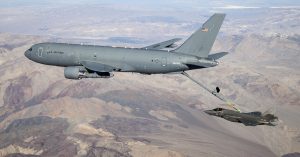
Boeing is still dealing with the issue of debris and tools left behind in sealed compartments of some of those new KC-46 tankers delivered to Air Force bases in Oklahoma and Kansas.
A company spokeswoman told reporters at the Paris Air Show this week the company placed “fierce focus” to make sure the debris incidents do not happen again.
“We had missteps. We owned those,” said Leanne Caret, CEO of Boeing Defense, Space and Security, during a briefing at the Paris Air Show Monday according to Air Force Times.
As previously reported, the Air Force agreed this spring to start accepting KC-46 tankers from Boeing again after the discovery of foreign debris halted production for the second time. Moving forward, all tankers will be subject to stringent inspections of all sealed compartments of the plane for foreign object debris, or FOD.
Those inspections are taking place and aircraft are being delivered, Caret confirmed, with a multi-tier inspection process happening in partnership with the Air Force both for new deliveries and aircraft already in the fleet.
“Fair to say we’re going above and beyond what [the Air Force] required,” said Greg Smith, Boeing’s chief financial officer and executive vice president of enterprise performance. “We’re doing what we feel is best, and learning from it… We have to set the bar higher than our customer has and deliver on those expectations we set for ourselves.”
The left-behind tools and debris were found when the new tankers were delivered to Altus Air Force Base and the McConnell Air Base in Wichita, Kansas.
The Air Force has said that the FOD found posed no safety of flight risk and was well within what the Defense Contracts Management Agency finds on many aircraft programs.
“But it’s not acceptable to have it on a new aircraft that we bought,” said Will Roper, the Air Force’s assistant secretary for acquisition, technology and logistics, in April on the sidelines of Space Symposium. He added that Boeing would do the inspections “on their nickel,” though Caret declined to comment on any changes to the contract or the amount of funding withheld to pay for the added layer of scrutiny.
“The debris and tools that were left on KC-46 upon its delivery were unacceptable. We took swift decisive actions,” Caret said. “We’re using this opportunity as our rallying cry – to ensure we enhance our process, [and] more specifically for first time quality across every aspect of the business across the company.”





